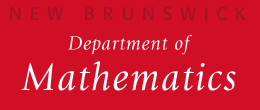Class Rosters/Grade Submissions
The link for on-line rosters and other useful services for faculty is found at https://ess.rutgers.edu/services/faculty-staff.html under "Class Rosters/Grade Submission". Your rci login is required.
These can be downloaded in a number of formats, and include email addresses. The default view of the rosters offers one format for downloading as a spreadsheet. Viewing the roster as an "alphabetical roster" brings up three alternatives: spreadsheet (xls), comma separated (csv), and roster photos (pdf). The xls format can be read under unix/linux using openoffice software.
The system also accepts uploads of the requested data.
Other Grade Symbols. (See also: SAS Policies for Pass/No Credit.)
Warning Rosters
There are three codes for warnings:
- W1: poor performance
- W2: poor attendance
- W3: both
One wants to give (and grade) a midterm before warnings are due. See the Registration Calendar for the due date. The due date for on-line submission appears to be on or after the 46th day counting from the beginning of the term, with hard copies due two days earlier.
Spring 2007: Warning rosters due March 7 (paper) or March 9 (noon, Web).
Add-Drop Period
Students have one week to drop classes without any record remaining on the transcript, and an additional day to add them. They have 8 weeks to drop classes with a "W" notation remaining on the transcript.
The School of Engineering adds 4 weeks to this, with a Dean's permission. That policy is here.
Teaching Observations
When possible recitation instructors should be observed at least once per term. A form for reporting observations is found at https://www.math.rutgers.edu/undergrad/TA_Evaluation/.
The information on this form is used for making future teaching assignments, for writing teaching letters included with job applications, and for selecting students for teaching awards. The form is also included in files in the graduate office, and is available to the student or PTL for review along with his or her student evaluations.
This material is also stored in a database, with access currently limited to faculty having an administrative need for it.
Attendance and course cancellations
In accordance with Rutgers University regulations, attendance is expected at all regularly scheduled meetings of a course and individual courses may set policies for maximum absences. Students may obtain a note from the SAS DeanĘs office to authenticate an absence that is supported by appropriate documentation. Faculty notified of authenticated absences should make reasonable accommodations to allow students to make up work that counts toward their term grade.
Absences due to religious observance, participation in university-sponsored events or activities such as intercollegiate athletics, or documented chronic illness are treated as authenticated absences when students present a note of authentication from the SAS DeanĘs office. Authenticated absences do not waive the overall policy for attendance. Students who must, for any reason, miss more than an occasional class should consult with their instructors and an academic advisor.
It is the policy of the Rutgers University not to cancel classes on religious holidays. For information on the cancellation of classes due to inclement weather, see the University Policies and Procedures section.
From the Interim SAS Academic Policies and Procedures
Special permission for closed sections, and prerequisite overrides
For special permission to register for a closed section,
details can be
found here.
For prerequisite overrides,
details
can be found here.
Final Examination Conflicts
An official final exam conflict occurs when a student has:
- More than two (2) final exams on one calendar day
- More than two (2) final exams scheduled in consecutive periods (ex: A student has exams scheduled for 4:00-7:00 pm and 8:00-11:00 pm on one day and 8:00-11:00 am on the following day.)
- Two final exams scheduled for the same exam period.
Students are expected to provide copies of their final examination schedule when reporting a conflict. The UG Office can verify conflicts. As instructors in large courses generally have scheduled makeups, conflicts are usually resolved by rescheduling an exam in a large course. Where there is a sequence of three exams, if it is convenient to reschedule the middle exam that may be preferred.
Conflicts must be resolved but the determination of which exam is to be rescheduled is not left to the student but to the instructors involved, or their departments.
Ref: http://sasundergrad.rutgers.edu/academics/forms/exam.html
These conflicts are administrative conflicts. Other conflicts with employment or religious obligations, or cases in which examinations are missed due to emergencies or health issues, are handled on an individual basis. Timely notice is expected, where feasible in advance of the examination.
SAS Quantitative and Formal Reasoning Requirement
Two "quantitative and formal reasoning" courses, not necessarily in the mathematics department.
Judicial Affairs
All cases go through the Undergraduate Office. They are submitted to the Office of Judicial Affairs. The new (interim) policy documented in the reference above allow some management of minor cheating issues by the faculty (Level 1 and Level 2 offenses). The bulk of our cases concern cheating on midterms or finals and other comparably seriously matters, and these all come to the office. If you suspect cheating, notify the Undergraduate Vice Chair. Cheating on homework assignments can be handled by the instructor but still needs to be coordinated with the office as there is a specific procedure to be followed.
It is worth applying considerable effort to prevention. In particular it is customary to make multiple copies of exams for large classes, or for small classes with crowded testing conditions, to establish a seating chart via a sign-in list, and to proctor vigilantly. If additional proctoring resources are needed the Undergraduate Office can arrange for that, given timely notice.
Students accused of cheating will normally receive a TZ (not a TF) grade. An exception may be made for students who are failing and whose grade cannot possibly be affected by the outcome of the cheating case. (Failure to complete an examination due to alleged cheating would not constitute such a case.)








